After a few seasons where even mediocrity was out of their reach, it’s all the more surprising to say the following: the Manitoba Moose are absolutely tearing up the AHL. As of December 2, the Moose are 3rd in the league in winning percentage, behind only the Toronto Marlies and Wilkes-Barre/Scranton Penguins; tied for 1st in points, 1st in goals for, and goals per game, and 1st in goal differential. They’ve won 8 games in a row, and took 12 of 14 in November. Overall, the turnaround has been nothing short of jaw dropping.
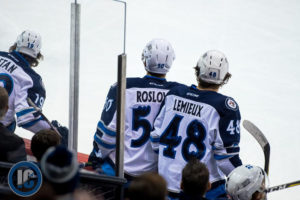
Photo Credit: Colby Spence
Here are some key stats for November:
| November Team Stats | |
| Record | 12-2-0-0 |
| GF | 55 |
| GA | 27 |
| Shots For | 419 |
| Shots Against | 495 |
| Shooting % | 13.1% |
| Save % | 94.5% |
| PDO | 107.7% |
As with most great teams, the contributions aren’t just coming from one or two players, but from a large group. Veteran forward additions, Buddy Robinson and Michael Sgarbossa have complemented their linemates extremely well – whoever they may be on that night – and been crucial in solidifying the top-6. While they’re both too old to be considered true prospects (both are in their mid-20’s), each of them is fighting for their next contract, and a potential NHL call-up. Veteran (29-year-old) Cam Schilling has been a revelation on the back-end – he’s the de facto #1 defenceman on this team, and dominates all three zones of play on most nights.
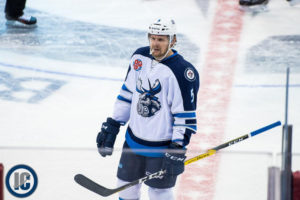
Photo Credit: Colby Spence
Continuing with the veteran theme, Michael Hutchinson has once again proven how good a goalie he is at the professional level – he’s tied for the league lead in save percentage (.947), 4th in goals-against-average (1.90), and sports a record of 8-1-1 on the year, including a 6-0-0 record in November and was named the CCM Goalie of the Month. Captain Patrice Cormier is also performing well in a middle-6 role, with 7 goals through 22 games, while J.C Lipon is making strong contributing as well, with 11 points in 14 games in November.
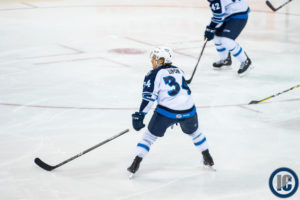
Photo Credit: Colby Spence
But the greatest source of excitement isn’t the play of the club’s veterans, or the team’s overall record – it’s the tremendous progress being made by its youngest players. Here’s a look at the top-10 prospects playing on the Manitoba Moose:
Top Moose Prospects
(1) Jack Roslovic – C/RW, 1997 year-of-birth (YOB)
Simply put, Jack Roslovic is the real deal. He was named AHL Player of the Month for November after scoring 8 goals and 11 assists for 19 points in 14 games. He had 6 multi-point games in the month, and was named the game’s 1st star on 4 occasions, and 3rd star once. He sits tied for 2nd in AHL scoring, with 26 points in 23 games, and he already has 12 goals this season – just one off his goal total from all of last season. To make things all the more impressive, he played last season as a teenager – a rarity in the AHL (only 6 teenagers played at least half an AHL season in 2016-17), so this dominance is coming at just 20 years of age, when most other non-elite prospects are just beginning their pro careers. Going beyond his offensive stats, Roslovic is also getting terrific experience in every situation – even-strength, PP, and PK, playing at both centre and right wing. His coach, Pascal Vincent has lauded him for his fitness, and admires his hockey sense and defensive abilities. While he may not have the pure offensive upside of a Scheifele or an Ehlers, Roslovic’s ability to excel in every situation at such a young age is truly impressive. His well-rounded game is reminiscent of Bryan Little, only Roslovic is more dynamic with the puck on his stick, and a better playmaker too. His NHL arrival at some point in 2018 (whether this season or next), creates the tantalizing possibility of three scoring lines on the Jets roster.
(2) Eric Comrie – G, 1995 YOB
For the past two years, Eric Comrie was praised as a potential goalie of the future, yet struggled to put up the type of numbers that were indicative of that level of talent. People like Steve Valiquette would talk about Comrie as one of the best goaltending prospects outside the NHL, yet his goals against was hovering around 3.00, and his save percentage was in the .907 range.
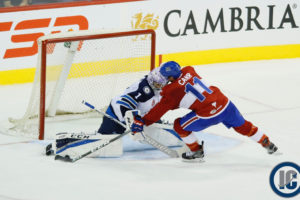
Photo Credit: Dave Mahussier
Now 22 years of age, with 2 pro seasons under his belt, the numbers are finally beginning to advocate for his underlying talent. Comrie had a 6-2-0 record in November, along a 2.14 Goals Against Average, a .936 save %, and 1 shutout. He was named 2nd star twice this past month, and 3rd star once. After a somewhat inconsistent first 6 games of the season, Comrie really hit his stride with a pair of road wins in games 7 and 8, allowing just 2 goals on 77 shots. He also pitched a shutout in his last Moose appearance on November 25 against Milwaukee, making 30 saves. While at 6’1, he’s a little smaller than most of the goalie’s coming up these days, he makes up for that with excellent technique, great quickness, and very strong hockey sense. He works hard in practice, has a wonderful attitude, and unique ability to analyze his play, and the play of those around him in a way that’s uncommon for a goaltender his age. He spoke prior to the season about how important it is for a young goaltender to get playoff experience at the AHL level; given his team’s position in the standings, that’s looking like a very likely possibility this season. Expect him to return to the AHL when Steve Mason’s health issues are resolved.
(3) Sami Niku – LD, 1996 YOB
If you like smooth skating, dynamic defencemen, this is the player for you. With 13 points through 23 games, Niku finds himself tied for 2nd in scoring among rookie defenders in the AHL. He put up 7 points in 14 games in November, and was named 1st star and 3rd star once each. In terms of production, he’s been most effective on the powerplay, where he has 6 of his 13 points, manning one of the two Moose PP units (Cam Schilling runs the other). Last game was a good example of what he brings with the extra man – he likes to shoot the puck, hitting a post in the first period on a wrist shot through traffic, but he’s equally effective as a passer, adding a primary assist on Michael Spacek’s snipe off a one-timer. Niku’s biggest asset is his speed and puck control. He has an almost Ehlers-like ability to carry the puck through the neutral zone, and is one of the two best skaters on the Moose along with Jack Roslovic. He’s been very good at generating corsi-for, placing second in shot attempts among Moose D at home this season. (Schilling is easily #1; note: corsi data is not being tracked on the road). At 21, Niku is still a young defenceman, but he’s already come a very long way for a guy who was drafted, unbelievably, in the 7th round of the 2015 NHL Entry Draft. Pending a rash of Jets injuries, expect him to spend all of this season with the Moose, and at least a little more time in 2018-19.
(4) Mason Appleton – RW, 1996 DOB
On a team that has done nothing but exceed expectations, Mason Appleton continues to be the biggest surprise of all. Appleton came out of the Michigan State University (NCAA) with very little fanfare, and was expected to play a depth role for the Moose this season. He started out the season in the bottom-6, and went pointless in his first 4 games. Credit to head coach Pascal Vincent, who saw enough in Appleton to move him up into the top-6 with two veterans in centre Michael Sgarbossa, and left/right winger, Buddy Robinson. Appleton had a strong October, with 8 points in 9 games, but that was only the start – he finished November on the top line with Jack Roslovic and Nic Petan, and put up 7 goals and 7 assists in 14 November games. He was named 2nd star once, and finished the month with a 1st star at home on Thursday, November 30th. He’s currently alone in 2nd in AHL rookie scoring, and is tied for 6th in overall scoring. He has 22 points in his last 19 games, and while some might assume that he’s been a passenger on some good line combos, that’s absolutely not the case. He’s a good skater, with good puck control and good hockey sense; he has good size, good reach, good playmaking skills, and a very good shot. Offensively, he’s pretty good at everything, and because his skill set is well rounded, he’s able to take advantage of, and complement other skilled players. Without sounding harsh, it’s important to point out how rare it is for a player with his lack of pedigree to have such a dominant start to his professional career – he went undrafted in his first year of eligibility in 2014, was drafted in the 6th round in 2015, and put up two good but unspectacular seasons in the NCAA. To put it simply, absolutely no one saw this coming from Appleton in his rookie year. The smart money says that he probably can’t keep up this type of point pace, and yet, this player seems to look more and more confident each time he steps on the ice. It’s probably too early to say what his upside might be at the NHL level, but it’s not unreasonable to suggest that he could be part of the Jets’ top-9 in a few years time.
(5) Brendan Lemieux – LW, 1996 YOB
With all the fanfare surrounding prospects like Roslovic, Niku, and Appleton, Brendan Lemieux quietly returned to the Moose after his 7-game cup of coffee, and put up 10 points in 8 games in November. He turned in two star-worthy outings, being named 2nd star and 3rd star once each. Lemieux shed a few pounds in the off-season and has been noticeably quicker this year, helping him generate more shots and scoring chances. Last season, Lemieux was averaging just 2 shots per game, while this season he leads the Moose with 3 shots per game, including 3.4 in November. (This doesn’t include Kyle Connor, who averaged 4.8 shots per game in only 4 games). Lemieux is the prototypical power forward at the AHL level – he loves to drive the net, tip pucks, and bang in rebounds, and he’s producing exactly as hoped, with 6 goals and 15 points in just 12 games. He also has the only shootout-winning goal on the season for the Moose. Lemieux could stand to dial back the aggression in his game, because he still takes more penalties than he draws at this point. Overall, he’s likely to be a bottom-6 player at the NHL level – someone who can chip in 10+ goals and help make your third or fourth line a legitimate offensive threat.
(6) Nic Petan – LW/C, 1995 YOB
Nic Petan is the only player on the Moose who could put up 13 points in his last 14 games and not consider that a success. That’s what Petan did in November, playing top-line minutes with Jack Roslovic, and a rotating cast which includes Chase De Leo, Patrice Cormier, and most recently, Mason Appleton. Petan is doing all the things you’d expect him to do – holding onto the puck until he can create a play, generating scoring chances for others, and keeping his head on a swivel. He darts around the ice quickly, and makes plays you don’t expect from anyone else, including those behind-the-back passes that look great when they work (as one did for Mason Appleton last game), but lead to scorn when they fail. Despite the undeniable talent and more than respectable stats, the truth is that Petan is entering an dangerous point in his career – after 86 games in the NHL, and 158 professional games overall, he’s nearing the end of his time as a “prospect”. Petan’s entry-level contract is up at the end of the year, and for most offensive forwards, this usually means that they’re running out of chances to make the NHL. In spite of the supportive cries of many in the analytics crowd, Petan has failed to cement his place in the Jets’ lineup, and if he doesn’t do so by the start of the next season, he’ll find himself on waivers next October. While this could give him an opportunity with another club, it also means that he’ll have used up one of his “lives”, and for a player who stands about 5’8, you only get so many chances. Each time that things don’t work out with an organization, the number of teams interested shrinks. So if things don’t work out with the Jets, or with club #2, he may not have many chances left. With forwards like Roslovic, Lemieux, and Appleton looking to pass Petan on the Jets’ depth chart as early as this season, and Kristian Vesailainen and Erik Foley another year or two behind, the Jets may gauge Petan’s value on the trade market at some point in 2018.
(7) Michael Spacek – C/RW, 1997 YOB
Spacek is an interesting prospect for the Jets. He’s much further behind than the first 6 on this list, but his offensive upside remains pretty high. After suffering an injury in October, Spacek returned to play 9 games in November. He finished the month well, with 2 goals and 3 points in the last 6 games, after just 3 points in his first 11 games. While you’d like to see bigger numbers from Spacek, who had 85 points in just 59 games last year in the WHL, you have to consider that he’s playing 4th line minutes, along with a small amount of powerplay time. He has been effective with the man advantage, earning 3 of his 6 points on the PP, including the game’s opening goal on Thursday night, and a beautiful set-up for Mike Sgarbossa on November 21st. He has high-end vision and playmaking skills, with an underrated shot, and is pretty tough to knock off the puck considering he’s at most 5’11, and 20 years old. It’ll be interesting to watch him develop over the coming years in the AHL, and to see what kind of player he becomes at 22 or 23. He has enough skill to be a middle-6 forwards at the NHL level, but he also could end up as a tweener – a high-end player in the minors, or perhaps in Europe.
(8) Jansen Harkins – C/LW, 1997 YOB
Like Spacek, Harkins has had a tough time getting anything more than 4th line minutes thus far this season. But unlike Spacek, he hasn’t had much opportunity on the powerplay. He still managed 4 points in 12 games in November. Harkins has missed a few games as a healthy scratch, as Pascal Vincent has platooned him recently with career minor-leaguer, Brody Sutter. As an AHL rookie playing low minutes, Harkins has a long way to go before he scratches the surface of the potential that made him a 2nd round pick in 2015. His best traits are his vision and passing ability, along with nice hockey sense, but his skating needs a lot of work, and he’s not the biggest guy either. Like Spacek, he has a lot of AHL hockey ahead of him, but given his impressive work ethic, it’s entirely possible that he could make big strides over the next 2-3 years.
(9) Chase De Leo – F, 1995 YOB
After a very slow start in October – 1 goal and 4 points in 9 games – De Leo picked it up a bit, with 9 points in the last 14 games. He’s filling an important middle-6 role for the Moose, and has proven to be quite versatile, playing any forward position, as well as in any situation – even, PP, and PK. But like Nic Petan, De Leo is in the final year of his entry-level contract, and is soon to lose his status as a “prospect” for the Winnipeg Jets. At 5’8, De Leo’s biggest issue is trying to create enough space for himself. Should be interesting to see if he can keep his strong play going into December. Unlike most of the other prospects De Leo has found himself bounced around from centre to wing and also to different combinations of players so his play in November is a testament to his adaptability.
(10) Peter Stoykewych – LD, 1992 YOB
There are a few reasons why Winnipegger, Peter Stoyewkych typically wouldn’t qualify as a prospect. He was a very late draft pick back in 2010, who had an undistinguished college career before coming to the AHL. He joined the Moose on an AHL-only deal, not an NHL, Entry-Level Contract like most other prospects, and he’s now 25 years of age – at least a year or two past what most would consider to be a prospect in the conventional sense. However, he’s notable here because he’s having a breakout year, with 14 points in 23, all at even-strength, (that puts him second on the Moose, and first among all Moose D), because playing defence takes most players longer to learn than playing forward, and because this is only his third full season in the AHL. Stoykewych has taken his game to a new level, appearing much more confident with the puck, and regularly making plays that he never would have dreamed of in his first two AHL seasons.
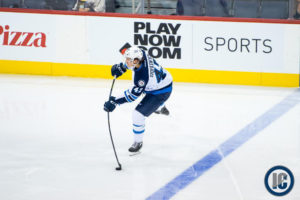
Photo Credit: Colby Spence
Moose announcer Mitch Peacock mentioned on Thursday that Moose assistant coach Eric Dubois has worked a lot with Stoykewych, encouraging him to jump up in the play more, and be more assertive with the puck. It’s certainly paid dividends thus far, and if he keeps this up, he might even earn himself an NHL contract at some point. All that said, Stoykewych will never be a flashy offensive player, but he has good size (6’2), decent skating, and pretty good hockey sense. It’s unlikely that he’ll ever become a regular NHL’er, but it’s now conceivable that he might one day realize the boyhood dream of playing in the NHL.
Team Scoring Summary
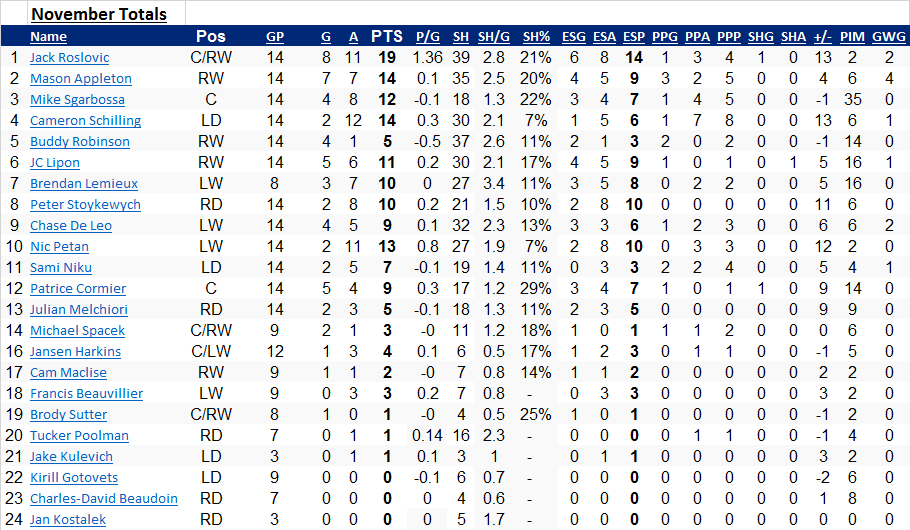
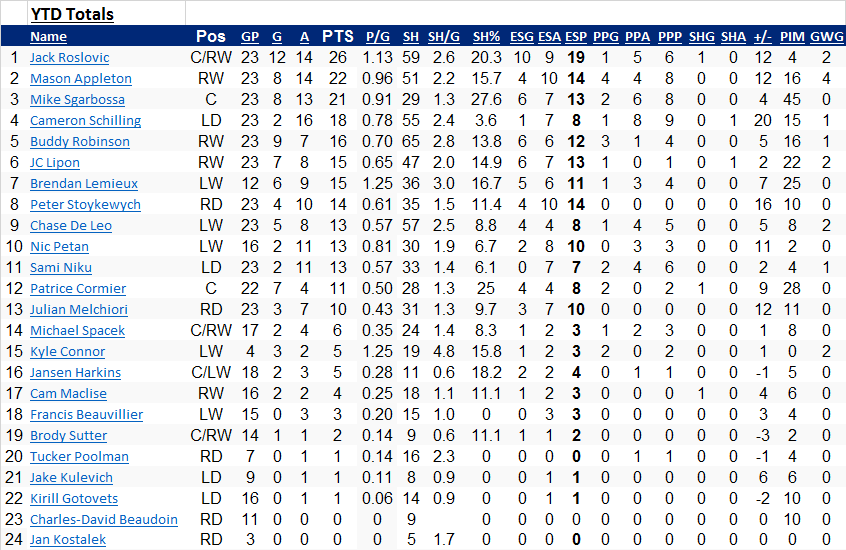
Most Recent Lineup (November 30 vs. Cleveland)
Petan-Roslovic-Appleton
Lemieux-Cormier-Robinson
De Leo-Sgarbossa-Lipon
Beauvillier-Spacek-Sutter
Schilling-Stoykewych
Niku-Melchiori
Gotovets-Kostalek
Hutchinson
Phillips
As always stay tuned for the latest Winnipeg Jets and Manitoba Moose news by keeping it locked to illegalcurve.com and on social media including Twitter | Facebook | Instagram.



